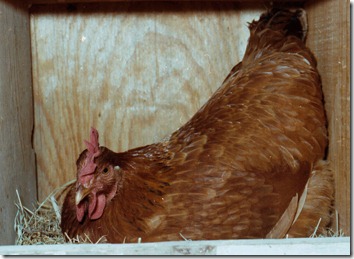Ideas - All Paths Lead from Home
Original Post: 16 April 2012
Posted Here: 5 December 2017
 Some time ago I was asked to talk to my critique group about how I write my short stories and novels. My first thought was “That’s like asking a chicken how it lays an egg.” I wasn’t sure that I knew how I write my stories. And I wasn’t sure that I should put my methods up as an example to others. So, take my posts about writing science fiction with a large grain of salt. You may want to incorporate some of my ideas into your own writing technique—or you may want to look at what I have to say as examples of how not to write.
Some time ago I was asked to talk to my critique group about how I write my short stories and novels. My first thought was “That’s like asking a chicken how it lays an egg.” I wasn’t sure that I knew how I write my stories. And I wasn’t sure that I should put my methods up as an example to others. So, take my posts about writing science fiction with a large grain of salt. You may want to incorporate some of my ideas into your own writing technique—or you may want to look at what I have to say as examples of how not to write.
With this disclaimer in mind, I’ve thought back over the past few years and tried to figure out what it is that I’ve done to write a story. I’ve taken a creative writing course at South Arkansas Community College and I’ve read several books about writing. I’ve learned that some writers say that you should do it THIS WAY. Others say, no, do it THAT WAY. Looking back at my writing, which has been influenced by all of these sources, I see that I have followed any one of three main paths. Which path I took (and, in reality, it was usually a combination of paths) depended on the story and how I came to write it. At the moment, though, I’m not sure which stories resulted from following which path.
All stories begin with an idea, your home base. The idea may be about how the story starts or how it ends. Sometimes it comes from what seems like an interesting title (“All Paths Lead from Home” is a play on “All roads lead to Rome”). Some of my ideas came from an assignment for the Creative Writing Class I took or from a prompt from one of our critique group meetings.
Sometimes an idea comes from modifying some common word: My daughter-in-law, Clarissa, talking about Super Bowl Sunday, came up with “Superb Owl Sunday,” which gave me the title for a chapter in The Centaurian Bud Vase and led to naming a starship The White Owl .
 I really like puns and spoonerisms. Changing “butterfly” to “flutterby” gave me the idea for Trittcha, a character in Silver Threads. “No wick for the rested” gave the the idea for a “shaggy dog” story and that story evolved into The Winds of Spring short story/chapter in Silver Threads.
I really like puns and spoonerisms. Changing “butterfly” to “flutterby” gave me the idea for Trittcha, a character in Silver Threads. “No wick for the rested” gave the the idea for a “shaggy dog” story and that story evolved into The Winds of Spring short story/chapter in Silver Threads.
Sometimes a story is based on something that happened to me. I really did cross what seemed like a bottomless pit on a timber in an abandoned gold mine (I’ve done some stupid things in my time), as described in The Breeze and Eye from The Centaurian Bud Vase. Or I wonder what would have developed if something different had happened to me. Ideas can be from a more general “what if” question—What if there were such things as plastidroids (which resulted in my Juan del Rio character), or what if Earth were to be ejected from our solar system (one of the threads in my Silver Threads novel), or what if a person’s “soul” could be transferred from a dying body to a newborn’s (how the starving occupants of the crashed starship, Newton, survived in the Raptors of the Depths short story/chapter of Silver Threads). The term “Rapture of the Depths” (nitrogen narcosis, which affects divers who dive deep for too long) led to both the title, Raptors of the Depths and to the Raptors themselves as characters in that short story/chapter.
Sometimes it’s a combination of these things that helps the story to develop. My love of music, my love of puns, and my experience with the timber over the mine shaft led not just to the episode about the bottomless pit in The Centaurian Bud Vase, but to the title for a later chapter—In the Hole of the Mountain King. And that led to Ramunus being a “Mountain King” rather than just a king.
Ideas come from everywhere. And you can find lots of places to go from there.
Keep reading/keep writing – Jack